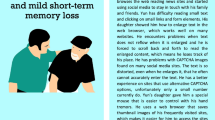Abstract
The purpose of the study was to develop a computer access assessment system for improving computer access of individuals with physical disabilities for the first time in South Korea. Korea-Computer Access Assessment (K-CAAS) presented in this article tests three user skills in aim, drag, and menu. Skill levels of the three test areas could be set as primary, intermediate, proficient, and individualized according to individual’s needs and conditions. All tests have their default set in each level, and the skill levels can be selected and changed by the abilities and goals of a user. Tests could be selected for users’ training and, their results could be traced and shown. Therefore, the K-CAAS is a training program to improve computer access skills as well as an assessment program. It would help users with physical disabilities operate a computer by themselves as improving their computer access skills.
Access this chapter
Tax calculation will be finalised at checkout
Purchases are for personal use only
Similar content being viewed by others
References
Ministry of Health and Welfare, Statistics Portal. http://stat.mw.gokr/
Go D, Park K, Yook J, Yoo J (2007) A fiel study on access and use electronic & information technology assistive device of person with disabilities. J Special Educ Theory Pract 8(2):319–343
National Information Society Agency (2011) Status survey on digital divide 2012
Yook J (2011) Designing computer workstation for a university student with cerebral palsy. J Rehabil Technol 2(7):41–58
Park G, Yun H, Park S, Yook J (2011) Status of assistive technology devices use of teachers for students with physical disabilities. J Rehabil Technol 2(3):17–39
Koester HH (2004) Compass Koester performance research
Assistive Technology Inc. (2002) EvaluWareTM: assessment activities for AAC and computer access
Acknowledgments
This work was supported by the Technology Innovation Program (100036459, Development of center to support QoLT industry and infrastructures) funded by MKE/KEIT, Korea, 2012.
Author information
Authors and Affiliations
Corresponding author
Editor information
Editors and Affiliations
Rights and permissions
Copyright information
© 2013 Springer Science+Business Media Dordrecht
About this paper
Cite this paper
Kim, J., Yook, J. (2013). The Development of Korea: Computer Access Assessment System (K-CAAS) for Persons with Physical Disabilities. In: Kim, K., Chung, KY. (eds) IT Convergence and Security 2012. Lecture Notes in Electrical Engineering, vol 215. Springer, Dordrecht. https://doi.org/10.1007/978-94-007-5860-5_59
Download citation
DOI: https://doi.org/10.1007/978-94-007-5860-5_59
Published:
Publisher Name: Springer, Dordrecht
Print ISBN: 978-94-007-5859-9
Online ISBN: 978-94-007-5860-5
eBook Packages: EngineeringEngineering (R0)




